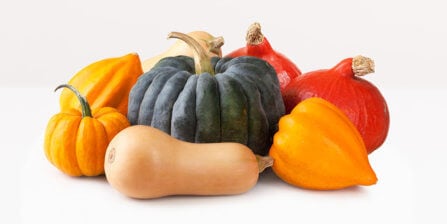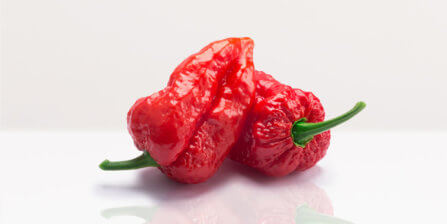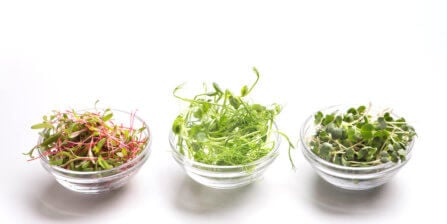Grocery Guides
The Ultimate Guide to Spring Vegetables

As winter fades away, the arrival of spring brings a vibrant array of fresh vegetables that breathe new life into our kitchens. From the crisp and peppery notes of watercress to the earthy delights of morel mushrooms, these spring vegetables offer a cornucopia of flavors waiting to be explored.
In this post, we’ll cover what seasonal veggies to look for when scouring the grocery aisles, as well as our favorite recipes to celebrate spring’s bounty.
Table of contents
- Lettuce
- Artichokes
- Peas
- Collard greens
- Spinach
- Arugula
- Kale
- Broccoli
- Asparagus
- Carrots
- Rhubarb
- Celery
- Mustard greens
- Cabbage
- Beets
- Watercress
- Cauliflower
- Ramps
- Morel mushrooms
- Cardoons
1. Lettuce

Lettuce is harvested in the early spring when temperatures are still cool, keeping the leaves tender and crisp. This nutrient-dense leafy green is high in vitamins A and K and provides antioxidants and essential fibers to support gut health. It’s the perfect vehicle for fresh spring salads and wraps.
What to look for:
- Crisp, vibrant leaves with no wilting or browning
- Firm, heavy feel
How to store:
- Refrigerate dry in a perforated bag, avoiding moisture.
Shelf life:
- Whole head: 1-3 weeks
- Cut or bagged: 5-7 days
Our top recipes:
2. Artichokes

Artichokes are loved for their unique flavor and versatility. Their earthy, mildly sweet taste and meaty texture make them a perfect appetizer or light lunch. Rich in fiber, antioxidants and vitamins C and K, artichokes contribute to digestive health and immune system support.
What to look for:
- Tightly packed, firm leaves
- Leaves should squeak when pressed together
- Plump, heavy feel
- Intact stem that isn’t dry or shriveled
How to store:
- Refrigerate in a perforated plastic bag wrapped in a damp paper tower to retain moisture.
Shelf life: 1-2 weeks
Our top recipes:
3. Peas

With a satisfying crunch and a hint of natural sweetness, fresh peas add a delightful burst of flavor to various dishes. Not only are they delicious, but peas also pack a nutritional punch, offering a rich source of vitamins and fiber. While a common staple in cozy pot pies or fried rice, they also make an excellent addition to fresh salads and pasta.
What to look for:
- Bright green, plump pods free from blemishes
- Cool to the touch
- No wrinkles, mold or overly puffy appearance
How to store:
- Refrigerate in a perforated plastic bag or loosely sealed container.
Shelf life:
- Unpeeled: 2-3 days
- Peeled: 1-2 days
Our top recipes:
4. Collard greens

Collard greens are hearty leafy vegetables popular in the South, but they can complement a wide array of cuisines with their balanced earthy, bitter taste. While these spring veggies can be enjoyed raw, they truly shine when cooked — a classic Southern dish involves simmering collard greens with smoked ham hock or bacon for a savory, tender result. For a healthier take, saute collard greens with garlic and olive oil.
What to look for:
- Deep green, crisp leaves
- Firm stems
- Relatively large leaves free from holes
- Slight glossy appearance
How to store:
- Wrap in a damp paper towel and refrigerate in a perforated plastic bag. Store in the vegetable crisper drawer of your refrigerator.
Shelf life:
- Whole: 1-2 weeks
- Cut or chopped: 3-5 days
Our top recipes:
5. Spinach

Popeye’s spinach power-up wasn’t a complete gimmick. Spinach is a nutritional powerhouse rich in vitamins A, C and K, as well as iron, folate and antioxidants. It can be incorporated into various dishes, such as salads, smoothies, omelets or sandwiches. Buy pre-washed spinach for a quick and easy packed lunch salad or to add some leafy greens to sauteed rice or scrambled eggs.
What to look for:
- Rich green leaves
- No yellowing, wilting or slimy spots
- Crisp tender stems
- Small leaves (they’re more tender than larger ones)
How to store:
- Line a perforated plastic container with a paper towel and refrigerate in the vegetable crisper drawer.
Shelf life: 3-7 days
Our top recipes:
6. Arugula

Arugula’s peppery, slightly nutty flavor adds a distinctive kick to a variety of dishes. Include it in salads for a peppery twist, toss it into pasta dishes just before serving or layer it on sandwiches and wraps to enhance flavor and nutritional benefits. You can even eat it by itself with a sprinkle of Parmesan, a drizzle of extra-virgin olive oil and a squeeze of lemon juice.
What to look for:
- Vibrant, deep green leaves
- Peppery aroma
- Smaller leaves
- No condensation or excess moisture in packaging
How to store:
- Line a perforated plastic container with a paper towel and refrigerate in the vegetable crisper drawer.
Shelf life: 3-7 days
Our top recipes:
7. Kale

Once only used to line self-serve salad bars, kale is one of the health world’s newest food staples. Packed with vitamins A, C and K as well as fiber, kale promotes heart health, supports immune function and contributes to strong bones. Include it in salads as a hearty base, saute it with garlic and olive oil as a nutritious side dish or blend it into smoothies for an extra nutrient boost.
What to look for:
- Firm, dark green leaves
- Sturdy stems
- Smaller leaves
How to store:
- Line a perforated plastic container with a paper towel and refrigerate in the vegetable crisper drawer.
Shelf life:
- Whole: 1-2 weeks
- Cut or chopped: 3-5 days
Our top recipes:
- Kale salad with cranberries and almonds
- Easy crispy kale chips
- Roasted kale seasoned with garlic and red pepper
8. Broccoli

Whether you enjoy broccoli cheddar soup on a chilly day or tangy broccoli slaw on a hot afternoon, this versatile vegetable is a spring grocery must-have for a reason. Prep it for a family dinner side or experiment with main dishes where broccoli takes center stage.
What to look for:
- Firm, compact heads with tightly closed florets
- Firm stalks with green cut ends
How to store:
- Wrap in a damp paper towel and refrigerate in the vegetable crisper drawer.
Shelf life:
- Whole: 1-2 weeks
- Cut or chopped: 3-5 days
Our top recipes:
9. Asparagus

Asparagus has a snappy and crisp texture with a mild, earthy flavor that makes it a standout in the produce aisle. It’s the unsung hero in various dishes, playing a leading role in salads, pastas and stir-fries, or simply grilled and sprinkled with lemon for an effortless and tasty side. Loaded with vitamins A, C and K, along with fiber and antioxidants, asparagus isn’t just a flavorful addition to meals; it’s also a nutritional boost that supports digestion and immune health.
What to look for:
- Crisp spears with closed, compact tips
- Smooth texture and uniform green color
- Moist cut ends
How to store:
- Trim cut ends to remove any dried-out parts and stand upright in a jar or glass with about an inch of water at the bottom. Loosely cover the tops with a plastic bag and refrigerate.
Shelf life: 7-10 days
Our top recipes:
10. Carrots

Carrots have a naturally sweet and earthy taste that makes them an all-around delight. Whether you’re munching on baby carrots as a snack or grating them into salads, their crisp texture and subtly sweet taste add a refreshing element to any dish. Beyond just being the perfect partner for hummus, carrots are a great addition to stir-fries and hearty stews, bringing a touch of sweetness to savory dishes.
What to look for:
- Smooth, firm texture
- Vibrant orange color
- Heft (heavier carrots are juicier)
- Slightly sweet scent
How to store:
- Chop off leafy green tops and store carrots in a plastic bag or damp paper towel. Keep refrigerated in the crisper drawer.
Shelf life:
- Unpeeled: 2-4 weeks
- Peeled: About 10 days
Our top recipes:
- Carmelized honey-glazed carrots
- Roasted Parmesan-garlic carrots
- Spicy Vietnamese quick-pickled vegetables
11. Rhubarb

With its vibrant red stalks and slightly tart flavor, rhubarb is a true springtime delight. While it made it onto our spring vegetables list, it’s often treated like a fruit in pies, jams and crisps, perfect for Easter brunch. Whether you’re whipping up a classic strawberry rhubarb pie or experimenting with a savory rhubarb chutney, this zesty veggie is bound to add a burst of flavor.
What to look for:
- Firm, crisp and glossy stalks with a vibrant red or pink hue
- Medium to thick stalks (they tend to be juicier and less stringy)
- Firm, green leaves (if they haven’t already been removed)
- Heavy, dense stalks
How to store:
- Remove leaves and wrap stalks in a damp paper towel. Place in a perforated plastic bag and refrigerate in the vegetable crisper drawer.
Shelf life:
- Whole: 1-2 weeks
- Cut: 5-7 days
Our top recipes:
12. Celery

Add a satisfying snap to your seasonal spring dishes with fresh celery. Whether you’re dunking it in peanut butter for a classic snack or letting it strut its stuff in a chicken salad, celery knows how to bring the crunch to the table. It’s a great low-calorie ingredient and a champion hydrator, making it the ultimate guilt-free snack for hot afternoons.
What to look for:
- Bright green color
- Firm, tightly packed stalks
- Satisfying snap when bent
- Fresh, green leaves
- Medium-sized stalks
- Clean, mild aroma
How to store:
- Wrap in aluminum foil or plastic wrap and store in the vegetable crisper drawer. If already cut, wrap the cut ends in a damp paper towel to retain moisture.
Shelf life:
- Whole: 2-4 weeks
- Cut: 1-2 weeks
Our top recipes:
13. Mustard greens

Whether you’re a salad enthusiast looking to level up your greens game or a stir-fry aficionado craving a little spice, mustard greens pack a bold and peppery punch. While most often served as a sauteed soul food side, mustard greens can also be served raw, boiled, steamed, braised or blended — the possibilities are endless!
What to look for:
- Crisp, green leaves
- Lively, robust appearance
- Smaller to medium-sized leaves (larger leaves will be spicier)
- Slight peppery aroma
How to store:
- Store whole and unwashed in the crisper drawer in a perforated plastic bag lined with a damp paper towel.
Shelf life:
- Whole: 1-2 weeks
- Cut: 3-5 days
Our top recipes:
- Italian-style mustard green and sweet potato soup
- Mustard greens ‘n beans
- Mustard greens with apple cider-dijon dressing
14. Cabbage

Cabbage may look a bit underwhelming, but there’s a lot more to it than meets the eye. This versatile vegetable has been a culinary staple since the 14th century, found in traditional dishes like stuffed cabbage rolls and Irish colcannon. Another bonus? Its shelf life. You can keep a head in your fridge for quite a while, ready to be sliced and diced whenever you need a reliable and hearty veggie.
What to look for:
- Compact, heavy heads
- Tight leaves
- Crisp and vibrant leaves
- No cracks or holes
How to store:
- Store whole and unwashed in the crisper drawer in a perforated plastic bag or wrapped in aluminum foil or plastic wrap.
Shelf life:
- Whole: 2-4 weeks
- Cut: 1-2 weeks
Our top recipes:
15. Beets

Beets come in a range of colors, from the classic deep red to golden yellows and even candy-striped varieties that look like they’re straight out of a Dr. Seuss book. But these springtime vegetables aren’t just fun to look at — beets are a tasty source of fiber, potassium and nitrate, which can help lower blood pressure and improve athletic performance.
What to look for:
- Firm to the touch with no soft spots
- Smooth skin
- Vibrant color
- Fresh, crisp leaves
- Medium-sized (sweeter and more tender than large ones)
How to store:
- Cut greens about 2 inches from the beet and store unwashed in a perforated plastic bag in the crisper drawer.
Shelf life:
- Whole: 2-3 weeks
- Cut: 3-5 days
Our top recipes:
16. Watercress

Watercress is another leafy green spring veggie in season between April and June. It has a similar taste to arugula, though the peppery flavor is a bit milder. So if you’re looking to experiment with a new zesty salad base or sandwich topping, give watercress a try.
What to look for:
- Deep green color
- Crisp stems
- Fresh, peppery aroma
- Small leaves for a milder flavor
How to store:
- Place unwashed in a perforated bag with a damp paper towel and refrigerate in the crisper drawer.
Shelf life: 3-5 days
Our top recipes:
17. Cauliflower

Cauliflower, a versatile cruciferous vegetable, boasts a mild and slightly nutty flavor. Its taste is subtle, making it an adaptable addition to various dishes. From classic comfort foods like mashed cauliflower (a low-carb alternative to mashed potatoes) to trendy cauliflower rice or buffalo cauliflower bites, this veggie is like a culinary chameleon that’s low in calories, high in fiber and loaded with vitamins.
What to look for:
- Creamy white color with minimal yellowing
- Compact, firm heads
- Crisp, green leaves
- Neutral smell
How to store:
- Store in the crisper drawer completely dry in a perforated or loosely sealed bag. Place a dry paper towel in the bag to absorb excess moisture.
Shelf life:
- Whole: 1-2 weeks
- Cut: 3-5 days
Our top recipes:
18. Ramps

Ramps, also known as wild leeks, are a fleeting spring delicacy celebrated for their bold flavor that strikes a balance between onions and garlic. These wild greens bring a robust and earthy kick to dishes, making them a favorite among foragers and chefs alike. Popular in Appalachian cuisine, ramps are often featured in dishes like ramp pesto and ramp butter, or simply grilled for a deliciously pungent side.
What to look for:
- Firm, crisp leaves
- Clean, unblemished bulbs
- Strong aroma of garlic and onion
- Tender stems
How to store:
- Loosely wrap in a damp paper towel, place in a perforated bag and refrigerate in the vegetable crisper drawer.
Shelf life: 3-5 days
Our top recipes:
19. Morel mushrooms

Morel mushrooms are highly coveted in the culinary world for their distinct earthy flavor that’s impossible to replicate. With a unique texture that combines a meaty bite with a porous, honeycomb-like structure, this spring veggie lends a robust and nutty taste to dishes. These mushrooms are often sought-after for their rich umami flavor, making them a prized ingredient in various cuisines.
Just make sure to cook them thoroughly — raw morels may contain a natural toxin that is neutralized during the cooking process.
What to look for:
- Firm, plump appearance
- Uniform color
- Intact caps and stems
- Fresh, earthy aroma
How to store:
- Refrigerate unwashed in a breathable container lined with a dry paper towel.
Shelf life: 2-3 days
Our top recipes:
20. Cardoons

Closing out our spring vegetable list are cardoons. With their celery-like appearance, cardoons offer a mild, slightly bitter flavor. Popular in Mediterranean cuisine, especially in Italy and Spain, cardoons can be enjoyed seasoned and fried, sauteed or served alongside your favorite pasta. The inner stalks are often preferred for their tenderness and mild taste.
What to look for:
- Firm, tightly packed stalks with a uniform pale green color
- Crisp leaves
- Smaller stalks (they’re more tender)
How to store:
- Trim ends of the stalks, place in a perforated plastic bag and store in the vegetable crisper drawer.
Shelf life: 3-5 days
Our top recipes:
Start experimenting with farm-to-table dishes
April, May and June is the best time to break out of your comfort zone and try new, delicious spring vegetables fresh from the market. Experiment with vegan vegetable soups, or try adding a lesser-known leafy green to your table salad. Who knows, you might just discover your new favorite veggie!Hungry now? We don’t blame you. Shop seasonal veggies and more from home with Instacart’s easy grocery delivery service.
Most Recent in Grocery Guides

Grocery Guides
Guide to Sustainable Grocery Delivery
Who has time for the grocery store these days? Between work, family and everything else, it feels like a chore we could all do without. That's where sustainable grocery delivery comes in! You get the…
Feb 7, 2025
Grocery Guides
19 Best Milk Substitutes for Baking and Cooking
Milk’s rich texture and neutral flavor make it a staple in countless recipes, bringing creaminess and balance to sweet and savory dishes alike. But what happens if you run out of milk or need a…
Jan 30, 2025
Grocery Guides
15 Best Cheeses for Your Next Charcuterie Board
Let’s face it: The heyday of the store-bought party platter is long gone. Now, the duties of a good host often include curating an impressive charcuterie board. But where do you begin? Charcuterie boards typically…
Jan 21, 2025

 Squash – All You Need to Know | Instacart Guide to Fresh Produce
Squash – All You Need to Know | Instacart Guide to Fresh Produce  Ghost Pepper – All You Need to Know | Instacart Guide to Fresh Produce
Ghost Pepper – All You Need to Know | Instacart Guide to Fresh Produce  Sprouts – All You Need to Know | Instacart Guide to Fresh Produce
Sprouts – All You Need to Know | Instacart Guide to Fresh Produce 

